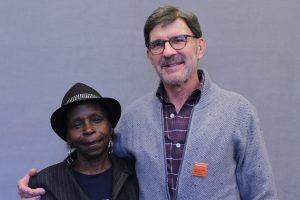Adrian Williams Interviewed by Dr. Terence Patterson
Recording: November 12, 2016
Transcript
I’ve always been impulsive. There was a greater need here than it was, you know, consulting about marketing. I don’t know, it was easy for me to do. It just gradually happened. I never went back.
[MUSIC PLAYING]
I’m Adrian Williams. Live here in San Francisco, the Western Addition. I think growing up poor in a little small town in Louisiana, being raised by a single parent, my mother, who was a hard worker, a dedicated parent, and just a community that came together to help to raise me and inspire me, helped me to learn the value of education. They forced me to desegregate a college my junior year, which is really traumatic.
– Which college?
Northeast University in Monroe. And so the summer of my junior year I spent there. Scary times. And vowed never to be in that position again, where I was forced to do something that was scary.
But then I decided to get out of Monroe, and to get out of the South. So I ended up going to Northwestern in Chicago, Evanston. And that was the start.
A friend of mine convinced me– a headhunter– to go interview for this pharmaceutical job. I said no, no, no, no. I’ve got a job. I’m going to relax.
He said, why don’t you interview, take the job, hang out for a month, I’ll get my commission. So I said, OK. Went on the interview with this man named Bill Carty. I’ll never forget, bluest eyes I had ever seen.
And he hired me on the spot. Gave me the keys to the company car, and told me to be in San Francisco in two weeks. So that’s how I ended up here.
It started out with me wanting to give back more. And then I noticed that over in San Francisco, that there was a high rate of murders. I also noticed that the little kids were on lockdown, so I was concerned that they wouldn’t be able to have lunch during the summer. So I decided that I would come over, organize this lunch program, feed the babies, and go back to work. So then I asked my boss for a leave of absence to come over and really start the Village Project, and I never went back.
So I took those babies, and I market them the way I did my product, and got people to collaborate and help me build this village. And it was a challenge. So that was the inspiration. I think we were really– our goal was to expose the board and the city about how kids are impacted by violence, and that some of their behavior exemplified in their lives is based on their continued exposure to violence.
I never hesitate to follow a dream or an idea. And so I would ask people to really give back more, to look out for each other more. And so I believe if we all looked after each other, treated each other with love, then it would be less violence. And then do, be a doer of the work, not just to hear of the work that inspired me.
[MUSIC PLAYING]
______________
Recorded by StoryCorps in partnership with the Office of Diversity Engagement and Community Outreach
Edited and produced by the Advanced Audio class (USF Media Studies), Julia Brekka, and Professor Beth Hoffman

